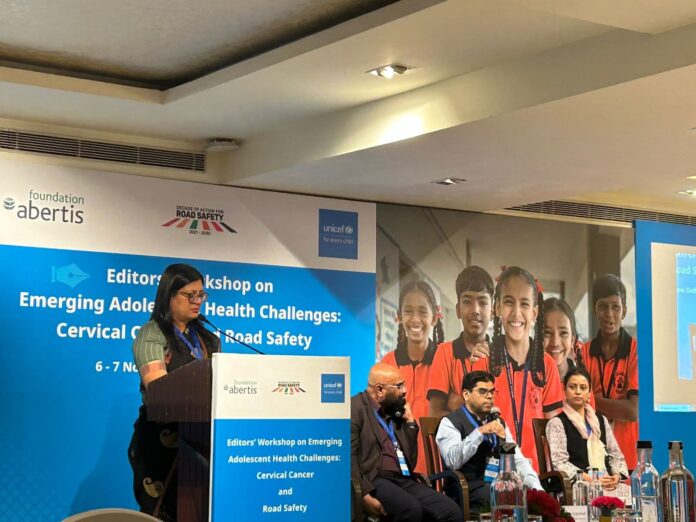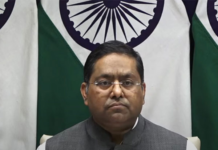New Delhi, Nov 16 (NVI) Cervical Cancer and Road Crashes are two huge issues that are claiming umpteen number of lives every day in India.
However, there is lack of awareness and sensitisation about these killer but preventable problems.
To address the gaps in awareness and sensitisation efforts, UNICEF recently held a two-day workshop for Journalists, including Editors, here.
The national Training of Trainers (ToT) workshop titled ‘Workshop for Strategic Engagement of Health Editors: Emerging Adolescent Health Challenges – Cervical Cancer and Road Safety,’ concluded with a strong appeal to the media to deepen its engagement in promoting awareness on cervical cancer prevention and road safety through evidence-based reporting.
The workshop featured in-depth deliberations with senior editors on applying Critical Appraisal Skills (CAS) for evidence-based reporting and strategic storytelling to advance adolescent health.
The workshop brought together senior editors, health journalists, media educators, and public health experts from across India to strengthen evidence-based, sustained, and human-centred reporting on cervical cancer and road safety.
Participants examined structural barriers within newsrooms, discussed the media’s role in countering misinformation, and developed strategies to connect public health data with real-life stories.
Addressing the opening session, Zafrin Chowdhury, Chief of Communication, Advocacy and Partnerships, UNICEF India, said, “Young people and the media audience at large deserve to know accurate information on health issues affecting them and the society. This can only happen when scientific and medical information is authentically and responsibly translated for the readers and audiences of the media.
“Nothing combats misinformation better than this approach. We need to learn, analyse, understand the professionally share technical information in a way that people can relate to and rely on.
“The media and those of you deliver the information, news and content are longstanding and strongest ally for us in UNICEF in reaching people with the critical information and knowledge they need.”
She went on to add: ”Awareness on cervical cancer or road safety, and an array of other issues, can be understood and disseminated way better with the lens of critical appraisal skills amongst journalists guided by senior editors, which UNICEF has supported over the past decade.”
In 2022, the country reported an estimated 79,103 new cases and 34,805 deaths due to cervical cancer which is largely preventable.
Dr Vivek Virendra Singh, Chief, Health (a.i.), UNICEF India Country Office, said, “Cervical cancer is the only cancer that can be prevented by a vaccine; preventable, and awareness is the most powerful intervention.
“The media can play a decisive role in breaking the stigma that keeps women from seeking help, by presenting cervical health not as a taboo, but as a shared public health priority. Every accurate, empathetic story helps move us closer to a future where no woman loses her life to a preventable disease.”
A special session on road safety, highlighted that India records over 150,000 road deaths every year, with children and young people among the most affected.
“Every crash is preventable, and the media can play a crucial role in reframing road safety as a shared social and governance issue that demands data-driven accountability rather than post-tragedy sympathy. Strong linkages between media, policymakers, and civic data platforms can ensure that road safety coverage focuses on prevention, enforcement, and equity,” Dr Singh said.
Dr. Pallavi Shukla, Associate Professor, Department of Preventive Oncology, AIIMS; Dr. Gautham M. Sukumar, Head, WHO Collaborating Centre, NIMHANS; and Mr. Anil Gulati, Chief of Filed Office a.i., UNICEF Madhya Pradesh, also addressed the participating Editors at the workshop.
Over two days, participants worked in four editorial groups to design newsroom strategies on improving the visibility of women’s health, especially cervical cancer, and road safety issues.
Editors also explored how Artificial Intelligence tools can support data analysis, research translation, and evidence-based storytelling, and discussed ways to make scientific research accessible to language and regional media.
The workshop was conducted under the Critical Appraisal Skills (CAS) framework, a UNICEF-supported initiative launched in 2014 in partnership with the Indian Institute of Mass Communication, Oxford University, and the Thomson Reuters Foundation.
The trained mentors will now act as master trainers and lead state-level workshops for journalists in Maharashtra, Madhya Pradesh, Bihar, Rajasthan, and Karnataka. These state-level engagements will strengthen language media capacities to address misinformation, improve the quality of reporting, and promote responsible, data-driven communication on cervical cancer and road safety. (NVI)








